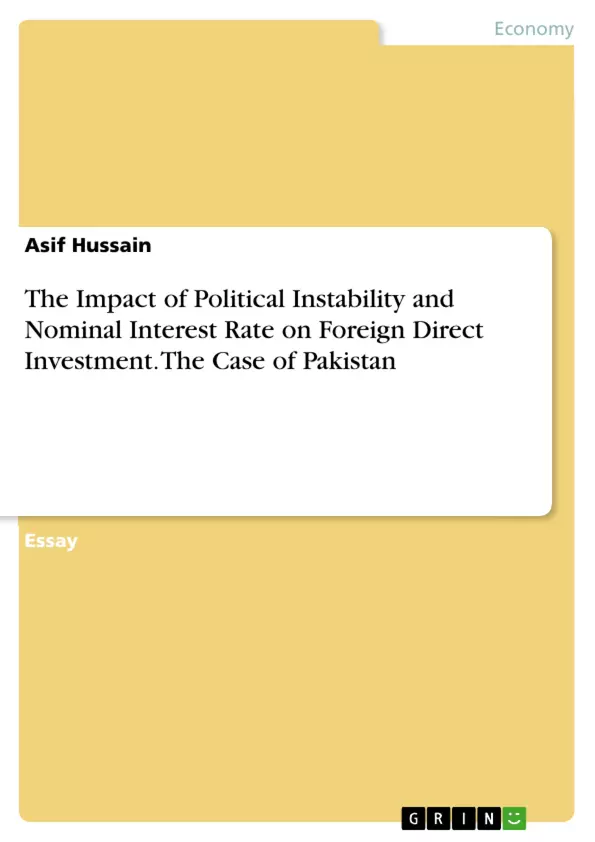This paper will focus on the impact of domestic interest rate and political instability on FDI of Pakistan using time series data from 1989-2019 in case of Pakistan.
The findings are that political instability has a major impact for short time period and in long time period but in case of interest rate there is a negative minimal impact on FDI in both span of time. This can be because when you have lower nominal interest rate, thenyour domestic investor will benefit and country GDP will rise.
Inhaltsverzeichnis (Table of Contents)
- Abstract
- Introduction
- 1.1 Background of the study.
- 1.2 Objectives..........\n
- 1.3 Limitation of the study.
- 1.4 Layout of the study
- 2 Literature Review
- 2.1 Literature from Developved World.
- 2.1.1 Literature From Developed World.
- 2.1.2 Literature from developing World.
- 2.2 Theoretical review
- 2.3 Summary: Rationale of the Study
- 3- Conceptual Framework and Strategy
- 3.1 Model Specification
- 3.2 Variable Description.
- 3.3 Data sources........
- 4 Research Design and methodology
- 4.1 Model specification..\n
- 4.2 Methodology
- 4.3 Results and discussion
- 5 Conclusion
- 5.1 Policy suggestion......
- 6vReferences......
- 7 Appendix
Zielsetzung und Themenschwerpunkte (Objectives and Key Themes)
This research paper aims to analyze the impact of domestic interest rates and political instability on Foreign Direct Investment (FDI) in Pakistan. Using time series data from 1989 to 2019, the study utilizes multiple regression techniques and other Ordinary Least Squares (OLS) methods to identify the relationship between these variables, considering both short and long time periods through the Autoregressive Distributed Lag (ARDL) model.
- The impact of domestic interest rates on FDI in Pakistan
- The impact of political instability on FDI in Pakistan
- The analysis of FDI trends in Pakistan from 1989 to 2019
- The role of government policies and initiatives in attracting FDI
- The challenges faced by Pakistan in attracting FDI
Zusammenfassung der Kapitel (Chapter Summaries)
- Abstract: This chapter introduces the research topic, outlining the focus on the impact of domestic interest rates and political instability on FDI in Pakistan. It highlights the use of multiple regression techniques and the ARDL model to analyze the relationship between these variables.
- Introduction: This chapter provides a background on FDI and its importance for economic development. It discusses the global trends in FDI, particularly in developing countries, and explores the factors that influence FDI inflows.
- Literature Review: This chapter presents a comprehensive review of existing literature on the relationship between domestic interest rates, political instability, and FDI. It examines studies from both developed and developing countries, exploring various theoretical perspectives.
- Conceptual Framework and Strategy: This chapter presents the model specification, variable description, and data sources used in the research. It outlines the theoretical framework guiding the study and the specific variables selected for analysis.
- Research Design and Methodology: This chapter details the research design, including the model specification, methodology employed, and the analysis of results and discussion. It describes the specific statistical techniques used to analyze the data.
Schlüsselwörter (Keywords)
The main keywords and focus topics of this research paper are: domestic nominal interest rate, FDI, political instability, multiple regression, ARDL techniques, ADF test.
Frequently Asked Questions
How does political instability affect FDI in Pakistan?
The study finds that political instability has a major impact on Foreign Direct Investment (FDI) in Pakistan in both the short and long term, discouraging foreign investors.
What is the impact of nominal interest rates on FDI?
There is a negative but minimal impact of interest rates on FDI. Lower nominal interest rates tend to benefit domestic investors and can rise the country's GDP.
What time period does the research cover?
The research analyzes time series data from Pakistan over a 30-year period, specifically from 1989 to 2019.
What methodology was used in this FDI study?
The study utilized multiple regression techniques, the Autoregressive Distributed Lag (ARDL) model, and the ADF test for data analysis.
What are the policy suggestions for Pakistan?
The paper suggests that stabilizing the political environment and managing interest rates effectively are crucial for attracting more foreign investment and fostering economic development.
- Citation du texte
- Asif Hussain (Auteur), 2021, The Impact of Political Instability and Nominal Interest Rate on Foreign Direct Investment. The Case of Pakistan, Munich, GRIN Verlag, https://www.grin.com/document/1059827



